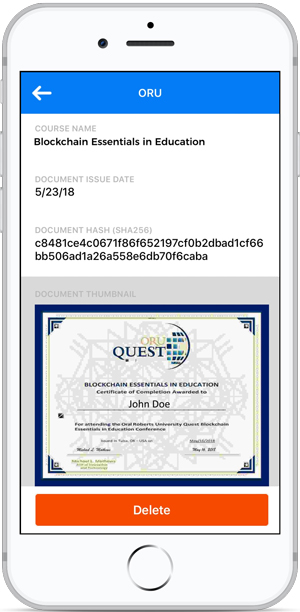Why Higher Ed Should Do More with Blockchain Tech
Oral Roberts University recently held a conference to persuade higher education institutions that it's time to get on board the blockchain train. Its recommendations: Learn about the technology's potential, test it out and collaborate.
- By Dian Schaffhauser
- 08/09/18
When Oral Roberts University hosted the one-day event, "Blockchain Essentials in Education," all attendees received a blockchain-based certificate from the Tulsa university verifying their participation. Perhaps nothing else could have illustrated the potential of blockchain technology more appropriately.
As CIO Michael Mathews, the event's organizer, explained, blockchain will be as important to transforming education as the internet was. He said he believes those colleges and universities that jump on the secure public ledger concept early enough and begin testing it out will be the ones who could see the biggest benefits.
Mathews believes blockchain will have the "biggest payback" within an organization's processes where trust is essential as part of a "value chain": student application processing, transcript evaluations, articulation agreements. Blockchain "templates" that run in the cloud could replace "entire cumbersome processes" — akin, he added, to when Microsoft Word templates were first introduced and people figured out how they could optimize word processing and mail merge.
During the event, Mathews asked attendees (who came from more than two dozen schools) to raise their hands if they could process a student application in less than a day. Nobody did so. Two days? The same. And so on. "The closest we got was six days," he said. If food companies can track tomatoes (IBM) and parcel companies (FedEx) can track packages and speed up validation using blockchain, he mused, "surely education can start helping people get accepted faster. When somebody out there is thinking they want to get a degree and you take three weeks to get back to them, they could have changed their mind already." Blockchain technology could "prove that all the information is correct and validate quicker to close out the deal."
Blockchain isn't the magic that "changes everything," he emphasized. "It is the tool that finally lets people see that we should and could speed up processes and validation and security all at the same time."
Establishing Digital Identity

ORU's Blockchain Essentials in Education certificate
To help issue those certificates as a demonstration of blockchain in action, Mathews called in Trusted Key, a startup focused on blockchain-based digital identity. As Chief Technology Officer Prakash Sundaresan described, his company approaches identity control by supplying a set of software services addressing the needs of the three parties involved in a transaction: the user, the "issuer" and the "relying party." In education, that might be the student, the institution and the prospective employer, respectively.
The technology is intended to provide a "trust layer" that allows the participants "to work together in a seamless way," he said. The Trusted Key App is a digital identity wallet controlled by the end user that allows the individual to receive and maintain "all the pieces of information from various issuers." Using the Trusted Key Digital Identity Platform, institutions would use the "issuer" service to produce and distribute digital diplomas or certificates. A school could "upload a file with the information about the students they want to issue it to, and our platform takes care of all the rest," Sundaresan said. "Students end up with that diploma in their identity wallet and then they are free to share that with whomever they want."
In the case of the ORU event certificate, he noted, "Every certificate that was issued would be signed by a key that [the university] owns. Then anybody receiving that certificate would know that this came from [ORU]."
How to Get Started with Blockchain
Sundaresan had two "take-aways" from his participation in the event. First, "there's a lot of enthusiasm for blockchain in the education community." That also exists in other segments where his company focuses — healthcare and financial services — but "education is a little more forward-looking. People are looking to the future," he said. Second, "We're still very early. The pioneers are kicking the tires on what this can do."
For people interested in kicking the tires themselves, ORU's Mathews offered three recommendations for joining the blockchain train:
Learn about it. "You wouldn't have sold the farm for the internet in 1992," he observed, "but by the year 2000, you better have. With blockchain, pay attention to how it's impacting industry and how it can apply to education." Make sure the knowledge goes beyond the IT crew, he added. "Educate your leaders." Sundaresan concurred: "When the business people start to get it, not just the technology experts, that's when you start to see the real transformation take place."
Test it. Take a low-stakes process that requires some form of verification and try blockchain "so you get the picture," Mathews suggested. He calls this "micro-innovation." "We'll never invest everything in blockchain, but we will see processes, validation and security improved through it."
Collaborate. Work with other institutions to help each other "on this emerging stuff." When people bring up what they're thinking of trying, he advised, listen closely in case there's something that applies to your own college or university too, where you can co-participate.
"It is extremely complex to do all the things that all the departments want," Mathews said. "They want more of their alumni, they want more of their prospects, more retention, more persistence, more better grades. And they're looking for a system to keep improving that. But in my 30 years on campuses I've learned that systems make very little impact on those things. They accommodate it, but they don't solve the real problem. What solves the real problem is somebody having the clearest line of sight and the shortest pathway to the person they're trying to connect to. That's blockchain."
About the Author
Dian Schaffhauser is a former senior contributing editor for 1105 Media's education publications THE Journal, Campus Technology and Spaces4Learning.